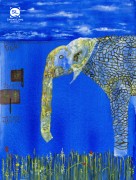After the initial premise is introduced, “My Body Double Begins the Whole 30 Diet” begins to tackle themes such as family, work-life balance, and fear of the body itself with admirable dexterity and subtlety. Do you plan to approach certain themes before writing a story? Or do they naturally arise from the language and plot? How do you choose when to emphasize themes and when to subdue them?
I don’t approach an individual story thematically, but as an entire body of essays and stories, my work is very concerned with how people reckon with others’ perceptions of their embodiment, and their body modification. As a trans person I’ve performed public acts of bodily defiance—pregnancy, hormone therapy, etc.—and have to reckon with a body that has an extra level of publicness and performance attached to it.
I’ve been writing about body doubles for a while. The center of the project is this narrator/protagonist. As an actor, he stands for something, and his double stands for him. The televised body is saying something in a heightened way the non-televised body isn’t, and spreading that tension among multiple bodies is like an exciting thought experiment that’s generated some fiction I’ve loved writing.
I’m really fascinated by television, almost awed by it as an art form. The way a good television show is its own engine and creates its own drama and comedy again and again, that inspires me. It challenges me. I want to be an engine. I love especially shows that center around one person, treating them both harshly and gently, often in the same episode. Shows like Fleabag and Insecure and One Mississippi and 30 Rock. Mining the personal for vaguely fictionalized comedy and drama, that’s my bag. Writing this sort of farcical fiction, I think it’s my way of coping with the taxing nature of memoir, which is what I usually write. The protagonist performs himself, or some fictionalized self, professionally, and I inserted the aspect of body doubles to up the zaniness and also this aspect of reflection—literal reflection, looking at another version of the self and having to reckon with that.
As the story builds, food serves as a metaphor or proxy for human connection. Salty popcorn and sweet snacks convey one kind of care while spinach and avocado convey another. In both instances, food might be a superficial shortcut to building sincere relationships—until we get to the hope and genuine effort behind making homemade avocado oil. What is your personal relationship to food and cooking? Do you use it to build community, to show love? Does food often appear as a dynamic in your writing?
I’m obsessed with food, with eating, with cooking, and with consuming culture about eating and cooking. A lot of my writing concerns people cooking for each other, or for themselves. I grew up hovering over my mother in the kitchen and I cook essentially all the food everyone in my family consumes, but I also feel like that never would have happened had I not been assigned female at birth. Cooking is strange because as a profession, it is often dominated by hyper-masculine energy, but on the other hand, the dailyness of home cooking is so often part of the labor women perform in an unbalanced way. It’s an interesting site of gender collision.
I really enjoy the paragraph that describes Carson as “not a beautiful man to most.” Here the stakes are raised, the story is anchored, and the reader understands the narrator is in a Laconian conflict concerning his own place within mainstream beauty standards. What’s important about parsing mainstream beauty standards and understanding efforts at body transformation?
A lot of my work is aggressively for and about trans people. I’m speaking as a trans person to us, and if cis people vibe with it, that’s cool too. But there are some things that pervade all of our culture. The body fueled by kale is something most people have to reckon with, and it’s about able bodies and traditional white beauty standards and gender norms and class. Ultimately, many of the ways I move and project my body are influenced by the ways cis people move and project their own bodies. I’m fascinated with the ways people who modify their bodies are connected. I’ve been doing Crossfit for seven years, and I have a lot of conflicted thoughts about it, about this community that preaches discipline and rigidity to someone who … well let’s just say the candy and video games are an autobiographical element of the piece.
The sentences and storytelling here are succinct and deftly build texture in both thought and concrete details by expanding from and contracting back into the dominant concept. What drafting and polishing methods, do you use to create the effect of staying focused while blending in peripheral details that carefully change the nature of the story?
I write lots of flash prose and I think small-big-small is how most of my work turns out thematically. I always start with the small—okay, I’m going to write about two coworkers having lunch—and then build out into larger themes. Writing is theatrical for me. My early drafts are focused on the blocking and stage directions—the guys are on a break, one is eating a salad, they’re talking about avocado—and then I build in the deeper layers later. While I always know the basic actions people will do early on, I’m often surprised by where my characters take me with what they think about what is happening to them.
Without considering this one, what’s a story or essay are you most proud of?
Most of my published work is essays, so I always get extra amped about fiction publications. I’m really grateful to New Delta Review for publishing my first body-double story, “Notes for My Body Double.”



 The core workshop of SmokeLong Fitness is all in writing, so you can take part from anywhere at anytime. We are excited about creating a supportive, consistent and structured environment for flash writers to work on their craft in a community. We are thrilled and proud to say that our workshop participants have won, placed, or been listed in every major flash competition. Community works.
The core workshop of SmokeLong Fitness is all in writing, so you can take part from anywhere at anytime. We are excited about creating a supportive, consistent and structured environment for flash writers to work on their craft in a community. We are thrilled and proud to say that our workshop participants have won, placed, or been listed in every major flash competition. Community works.